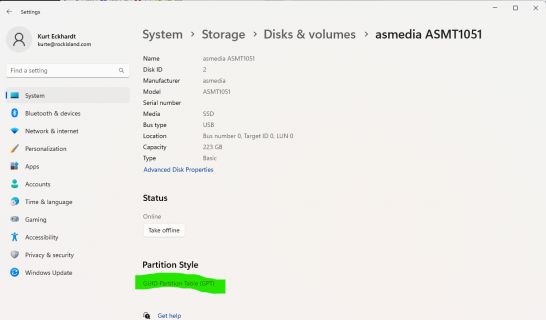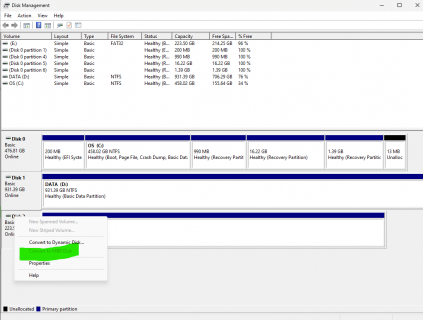Hi,
inside Arduino IDE I'm using the DriveInfo example from USBHost_t36\storage folder.
I attached an USB-socket to the USB host pins on Teensy 4.1 board.
An USB hub with a USB stick and a card reader together are recognized and a lot of information comes out at serial monitor.
But connecting a SSD (mSATA with USB adapter) fails.
1. Connecting directly to USB socket at USB host pins:
SSD enclosure has a LED. At beginning of sketch LED is flashing white, so program tries to access the SSD. Then LED stays white, so it gets only power. Connected to my computer colour changes to blue meaning that it is recognized.
2. Connecting to USB-Hub Red4Power R4-U002B:
3. Connecting to USB-Hub Orico TWU3-4A:
Orico TWU3-4A has a type C power port with "anti backflow design". So you can power harddisk that needs more current than a USB socket can deliver and it will not cause trouble by current flowing back to socket of a laptop. I try this also, may be USB host pins from Teensy can't deliver enough current. But same problem, same error code.
So USBHost_t36 doesn't work with SSD?
What is the meaning of these error codes?
Bye
Jürgen
inside Arduino IDE I'm using the DriveInfo example from USBHost_t36\storage folder.
I attached an USB-socket to the USB host pins on Teensy 4.1 board.
An USB hub with a USB stick and a card reader together are recognized and a lot of information comes out at serial monitor.
But connecting a SSD (mSATA with USB adapter) fails.
1. Connecting directly to USB socket at USB host pins:
Code:
04:35:23.825 -> Initializing USB drive 1...
04:35:26.207 -> initialization failed with code: USB drive error: 0x34,0x0 --> Type: NO_SENSE
Cause: UNKNOWN ASC/ASCQ (1Bh/B1h)SSD enclosure has a LED. At beginning of sketch LED is flashing white, so program tries to access the SSD. Then LED stays white, so it gets only power. Connected to my computer colour changes to blue meaning that it is recognized.
2. Connecting to USB-Hub Red4Power R4-U002B:
Code:
04:36:41.095 -> Initializing USB drive 1...
04:36:46.229 -> initialization failed with code: USB drive error: 0x23,0x0 --> Type: NO_SENSE
Cause: NO ADDITIONAL SENSE INFORMATION3. Connecting to USB-Hub Orico TWU3-4A:
Code:
04:38:45.902 -> Initializing USB drive 1...
04:38:48.150 -> initialization failed with code: USB drive error: 0x34,0x0 --> Type: NO_SENSE
Cause: UNKNOWN ASC/ASCQ (1Bh/B1h)Orico TWU3-4A has a type C power port with "anti backflow design". So you can power harddisk that needs more current than a USB socket can deliver and it will not cause trouble by current flowing back to socket of a laptop. I try this also, may be USB host pins from Teensy can't deliver enough current. But same problem, same error code.
So USBHost_t36 doesn't work with SSD?
What is the meaning of these error codes?
Bye
Jürgen




